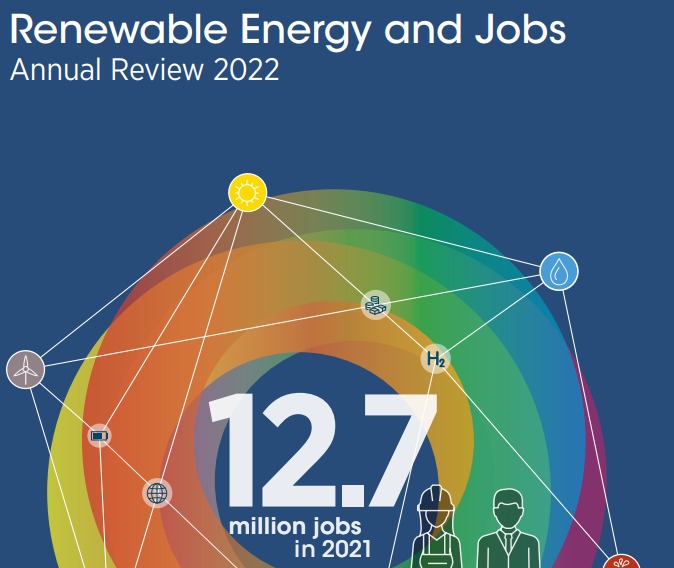World News26.09.2022
Renewable energy created 700,000 jobs in one year – IRENA’s 2022 Annual Review

QAZAQ GREEN. The ninth edition of IRENA’s series, Renewable energy and jobs: Annual review 2022, produced in collaboration with the International Labour Organization (ILO), provides the latest estimates of renewable energy employment globally. Based on a wide range of studies and reports the report surveys the global renewable energy employment landscape as of 2021.
Renewable energy created 700,000 jobs in one year and already employs 13 million people
Last year, the renewable energy sector reached 12.7 million jobs, an increase of 700,000 new jobs in a single year, despite the lingering effects of the COVID-19 pandemic and the growing energy crisis, according to a new report.
The report, Renewable Energy and Employment: 2022 Annual Review, identifies domestic market size as the main factor influencing job creation in the renewables sector, along with labour and other costs. It finds that solar is the fastest growing sector, generating 4.3 million jobs in 2021, more than a third of the current renewables workforce worldwide.
The report notes that, given growing concerns about climate change, recovery from the COVID-19 pandemic and supply chain disruptions, there is growing interest among countries in localising supply chains and job creation domestically.
It stresses that creating strong domestic markets is key to driving clean energy industrialisation. He adds that the development of export capacities for renewable technologies also depends on this.
According to Francesco La Camera, Director General of the International Renewable Energy Agency (IRENA), despite the challenges, the renewables sector has proven to be a reliable driver of job creation.
"My advice to governments around the world is to adopt industrial policies aimed at fostering the expansion of decent jobs in the renewables sector at the national level. Stimulating the domestic value chain will not only create business opportunities and new jobs for individuals and local communities, but it also strengthens the reliability of the supply chain and contributes to greater energy security overall".
The report reveals that more and more countries are creating jobs in renewables. Nearly two thirds of all these jobs are in Asia. China alone accounts for 42% of the global total, followed by the European Union and Brazil with 10% each, and the United States and India with another 7% respectively.
The Director-General of the International Labour Organisation, Guy Ryder, said that "beyond the numbers, there is an increasing focus on job quality and working conditions in renewables to ensure that employment is decent and productive"
Furthermore, she noted that the growing share of female employment indicates that with targeted policies and training it is possible to significantly boost women's participation in renewable professions and ultimately achieve a just transition for all.
"I encourage governments, trade unions and employers' organisations to remain firmly committed to the sustainable energy transition, which is indispensable for the future of work," said Ryder.
The report reveals some notable regional and national developments. For example, Southeast Asian countries have become major solar PV manufacturing centres and biofuel producers.
China is the leading manufacturer and installer of solar PV panels and is generating a growing number of jobs in offshore wind, while India has added more than 10 gigawatts of offshore wind, generating many installation jobs, although it remains heavily dependent on imported panels.
Europe now accounts for 40% of global wind manufacturing output and is the largest exporter of wind equipment, while trying to rebuild its solar PV manufacturing industry.
Africa's role is still limited, but the report notes that there are growing employment opportunities in decentralised renewables, especially in support for local trade, agriculture and other economic activities.
In the Americas, Mexico is the leading supplier of wind turbine blades. Brazil remains the largest employer in biofuels, but also adds many jobs in wind and solar installations.
The United States, meanwhile, is beginning to build a domestic industrial base for the emerging offshore wind sector.
The report emphasises that the expansion of renewables needs to be supported by comprehensive policies, including worker training to ensure decent, high-quality, well-paid and diverse employment, in order to achieve a just transition.
‘World’s first’ wooden wind turbine blades installed in Germany
Natron to kick off mass-production of long-life sodium-ion batteries
Tajikistan intends to fully switch to renewable energy sources by 2032 - deputy PM
Floating solar can power Africa’s energy goals, study finds
South Korean сompanies to modernize Kazakhstan's power plants, and GRES Topar
Decarbonization and sustainable development to take center stage at the 11th Annual Downstream Central Asia & Caspian Conference
Renewable electricity share in Turkey nears 50%
Sinn Power plans groundbreaking floating photovoltaic system in Bavaria
Swiss researchers boost efficiency of vertical axis wind turbines
Rapid expansion of batteries will be crucial to meet climate and energy security goals set at COP28
Georgia acquires first floating solar power plant
Wind turbine blades get a sustainable upgrade
China restricts offshore solar PV projects to specific sea areas
Biden announces $7 billion for solar energy in low-income communities
Production of a solar energy storage battery has started in Vilnius
Ainur Sospanova: Clear rules are needed for functioning of bilateral contracts market
Process to submit applications for RES auctions to construct HPPs and WPPs has commenced in Kazakhstan
JinkoSolar recognized as a Tier 1 Energy Storage Provider by BNEF
Japanese satellites will transmit solar power to Earth
Australia has planned a 1 GW hydroelectric power plant at former coal pit












